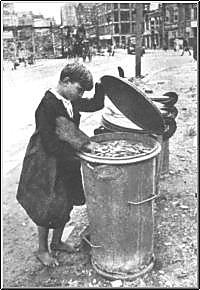Crimes and Mercies -- Hidden Holocaust Revealed
James Bacque, Crimes and Mercies: The Fate of German Civilians Under Allied Occupation (Toronto: Little, Brown, 1997).
Reviewed by Eric Blair
Canadian historian James Bacque's new book, Crimes and Mercies, is a sequel to his 1989 work Other Losses. While the latter focused on the fate of millions of German POWs at the end of the Second World War, more than a million of whom the Allies deliberately left to die of a synergistic combination of disease, exposure, and starvation, his current book focuses largely on the grim, post-war fate of 60 million German civilians.
Published this September [of 1997], Crimes and Mercies is over 300 pages in length. These include over 30 maps, photos, and illustrations; a foreword by historian and legal scholar, Alfred de Zayas, and an introduction by the author; eight chapters of text, as well as an index, bibliography, notes, and appendices.
But it is probably on page 131 that we find the epicenter of the book, and its seismic thesis; it is here, in a little, statistical chart, that Bacque's findings may be seen in a single glance:
Totals of Deaths
|
"Expellees" refers to the 16,000,000 ethnic Germans who were driven from their ancestral homelands in Poland, Hungary, Czechoslovakia, and elsewhere in Europe, at war's end. These included mostly women and children and elderly men who, with a few belongings in hand and running the gauntlet of deep, local animosity, set out upon the open road toward the rump state of Germany.
"Prisoners" are, of course, the German POWs, the subject of Bacque's first book.
"Residents" here refers to the German civilian population that survived the Second World War.
According to Bacque, given the extraordinarly harsh conditions imposed upon them by the Allies (i.e., the British, French, Soviets, and Americans), at least 9.3 million and possibly as many as 13.7 million Germans, had, by 1950, needlessly died as a result.
 He writes: "This is many more Germans than died in battle, air raids and concentration camps during the war. Millions of these people slowly starved to death in front of the victors' eyes every day for years."
He writes: "This is many more Germans than died in battle, air raids and concentration camps during the war. Millions of these people slowly starved to death in front of the victors' eyes every day for years."
Adding: "These deaths have never been honestly reported by either the Allies or the German government."
It is this dishonesty, which is also part silence, part indifference, part anti-German animus, as well as corrupt scholarship, that Bacque intends to remedy with the present volume. [Image: Barefoot German boy scavenges for food; Hamburg, 1946]
Weaving in and out of the central storyline are a number of recurring motifs.
There is the exposure of the unabashed inhumanity of the Allied leadership: Roosevelt, Churchill, Stalin, and De Gaulle.
 But it is the U.S. Treasury Secretary, Henry Morgenthau, Jr., who is the arch-villain of the piece, the one who hatched the serpent's egg: the vicious, vengeful Morgenthau Plan for the post-war "pastoralization" (read: the de-industrialization and abject subjugation) of the German people. [Image: Henry Morgenthau, Jr.]
But it is the U.S. Treasury Secretary, Henry Morgenthau, Jr., who is the arch-villain of the piece, the one who hatched the serpent's egg: the vicious, vengeful Morgenthau Plan for the post-war "pastoralization" (read: the de-industrialization and abject subjugation) of the German people. [Image: Henry Morgenthau, Jr.]
Devised, "cancelled," then implemented via the punitive directive JCS/1067, the Morgenthau Plan wreaked havoc on the German economy and, by extension, the fragile European economy.
Because of it, post-war reconstruction in Germany was delayed until late 1948; by which time millions of German civilians had already perished.
By starkest contrast, the hero of the book -- and to whom it is dedicated -- is Herbert Hoover.
It was Hoover who, in a spirit of Christian charity and true to his Quaker roots, led a worldwide food relief effort during the post-war era; saving, in the process, Bacque claims, probably as many as 80 million lives; a headspinner in a history book full of such daunting statistics.
Hoover also lobbied for a food program to relieve the desperate conditions inside Germany, which, along with the Marshall Plan, helped put an end to the Morgenthau nightmare and rescued literally millions of people from a slow, agonizing death.
Bacque also shines a hard light on the Western media, from the "New York Times" on down, for concealing or outrightly denying the Allies' complicity in numerous atrocities; on their craven betrayal of the anti-Hitler German resistance, the anti-Soviet Cossacks, and the Free Poles; and on the hideous cruelties they, as victors, inflicted on weak, defenceless, but fearless, German women seeking to help ill and starving husbands interned in Allied POW camps.
Bacque's determination to shine a hard light on some long-hidden and neglected truths regarding the Western Allies and their often inglorious actions during and after World War Two will, as sure as night follows day, provoke the animus of the coterie of mythologists who have dined out on simplistic notions of Allied heroism and decency -- and exclusively German villainy -- for the past half-century.
Recalling his bumpy ride following the release of "Other Losses", historian James Bacque expects that a firestorm will likewise follow the publication of "Crimes and Mercies".
Up in Canada, in the letters page of the "Toronto Globe and Mail", a debate has already begun; and signs of bitchery, if not nastiness, are already evident.
But what is encouraging is that Bacque also fully expects that the truth about this tragic page of German history will at long last be made known.
Crimes and Mercies can be purchased from The Institute for Historical Review, PO Box 2739, Newport Beach, CA 92659. $18.95 postpaid (CA sales tax $1.31).
No comments:
Post a Comment